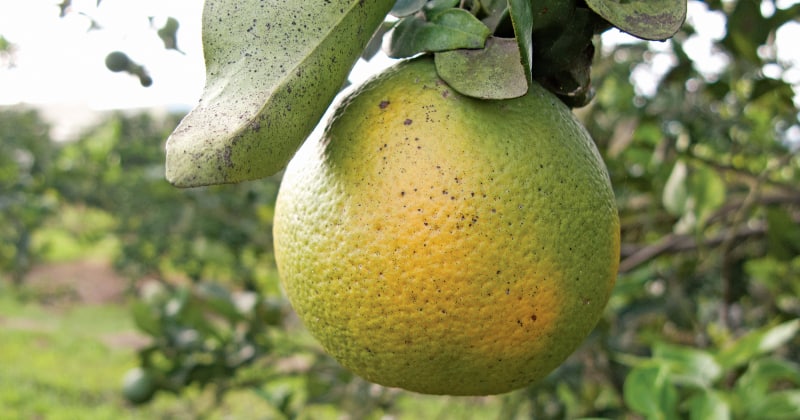After having poured millions into wasteful subsidies to Monsanto-Bayer to fight a bacteria that has wrecked Florida’s citrus groves, the lead person responsible for finding a solution has proposed a better idea.
He wants to treat infected trees with medication used to cure acne and venereal disease.
Other solutions on the table will take too long “to achieve the Big Reset,” Citrus Research and Development Foundation COO Rick Dantzler wrote in his June 2022 column.
“That will require a gamechanger, and the only one I see on the short-term horizon is a controversial one: injecting oxytetracycline (OTC),” Dantzler said.
Injection methods under study include firing an OTC-tipped .22 magnum bullet into the trunk of each tree.
The CRDF leader admits his idea is “controversial.” Oxytetracycline is an antibiotic “commonly used for the treatment of various infectious diseases like anthrax, Chlamydia, cholera, typhus, relapsing favor, malaria, plaque, syphilis, respiratory infection, streptococcal infection, and acne,” according to a succinct description on ScienceDirect.com. It is also commonly used to treat infections in livestock.
Based on what he calls “limited data,” Dantzler wants to “aggressively fund” research to inject the acne medication into citrus trees until something better comes along.
This is a reversal of previous policy, when Dantzler’s CRDF gave the thumbs-down to other potential solutions that years of small field trials have been shown to fortify citrus trees and fruits against the disease. That policy cost citrus growers precious years.
Is CRDF finally coming around?
“From the limited data I have seen and the trees I have observed, I believe injecting OTC will work. Novel formulations have increased uptake, injection devices are becoming more precise and less expensive, and the labor costs of injecting will become more bearable as production increases and quality improves. Other caretaking costs – like the number of fertilizer applications – should come down, too,” according to Dantzler.
Citrus greening has wiped out Florida growers with no end in sight, Dantzler admitted, which is why he is calling for what he calls “bold decisions.”
Dantzler cited only one case study that OTC could be an answer. “The Donaldson tree and others give me hope, but these solutions are still years away, and growers have told me they are out of time and money,” he said.
“Therefore, CRDF will aggressively fund research on injecting OTC so a smart decision can be made. We will continue meeting with industry partners to seek input and consult with regulators to impress upon them the urgency of our situation and the need for decisions to be made quickly,” the CRDF leader wrote.
Dantzler has come a long way from pouring millions into Monsanto-Bayer to develop genetically modified citrus trees at the expense of interim solutions. While it’s easy to make fun of using acne medication as a holding action, CRDF is at least moving in the right direction, at last, to find existing low-cost, high-impact measures for the medium-term.
In his recent column, Dantzler appeared to address grower apprehensions about CRDF’s effectiveness and honesty since its creation in 2009: “We will be transparent, open and truthful about our discoveries.”
Jesse Rojas is director of Save Citrus, a Florida-based coalition to promote off-the-shelf solutions to fight citrus greening disease. Follow him on Twitter @SaveCitrusTrees.








